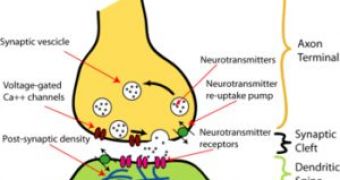Scientists at University of Oxford have found that adults really store new information in a slower pace than children because their neurons in memories' centers of the brain function differently.
Investigating neuronal activity in rats, the researchers concluded that younger brains may be more rapidly on learning, but older brains may store information more efficiently. Neurons send information to each other by signals that pass between them through synapses, cellular junctions. Some synapses are inactive and do not release chemical signals to transmit information to the next neuron. Highly detailed laser imaging, providing views at one micron wide, permitted the researchers to see how synapses behave. They also recorded the electrical activity provoked by calcium ions exchange through cell membrane. Silent synapses were found more prevalent in neurons of young individuals, and are activated only when new memories are stored. When activated, key receptors on the surface of these synapses become functional.
In older neurons, the researchers found fewer silent synapses, thought to have been exhausted. Thus, in older brains, neurons have to reuse the "un-silenced" synapses, which produce this way increased amounts of neurotransmitters, compounds that provoke in the receptors of the next neuron an impulse, that transmits the information from the previous one. "It might be the case that this is the reason infants are so able to store new information, such as language"Dr Nigel Emptage, lead researcher, explained. "But later in life, remembering things proves harder. That might be because the way we have to store information is fundamentally different, using parts of the system that have been used already."
"It is an exciting possibility that these lifespan changes in memory capacity are linked to cellular mechanisms of connectivity"said Emrah Duzel, honorary consultant neurologist at London's Institute of Cognitive Neuroscience at University College London.
"Different mechanisms are apparently involved in the acquisition of entirely new connections and the modification of existing connections."
"Young brains do tend to be able to absorb new information better than old ones, although not necessarily to integrate it as well with what has been learned previously" said Professor Keith Kendrick, head of cognitive and behavioral neurosciences at the Babraham Institute in Cambridge. "More extensive learning experience could perhaps also lead to more efficient representation and integration of information using existing 'active' synapses leading to a reduced dependence upon the presence of naive 'silent' ones."
"This study sets out an interesting idea, but it is one that still needs much more experimental."
Why Is Our Eyesight Not Shaky ?
Common Protein Found in Dementia and Sclerosis
Genes Function Differently in Human and Chimp Brain
Our Neurons Communicate Better Than Animal Neurons
New Generated Neurons Function Like "Old" Neurons

 14 DAY TRIAL //
14 DAY TRIAL //